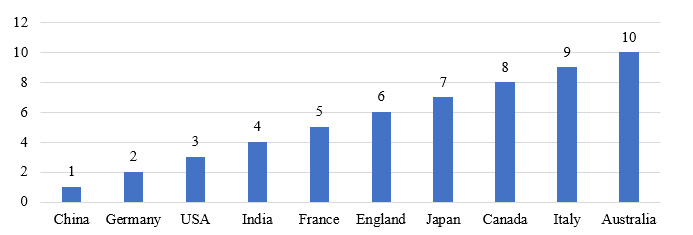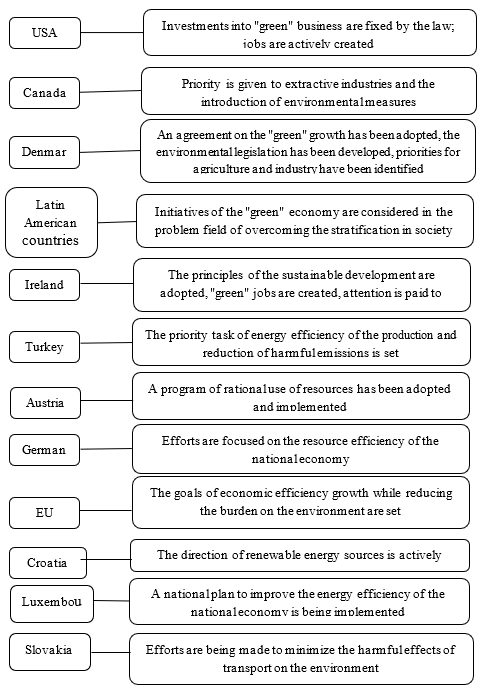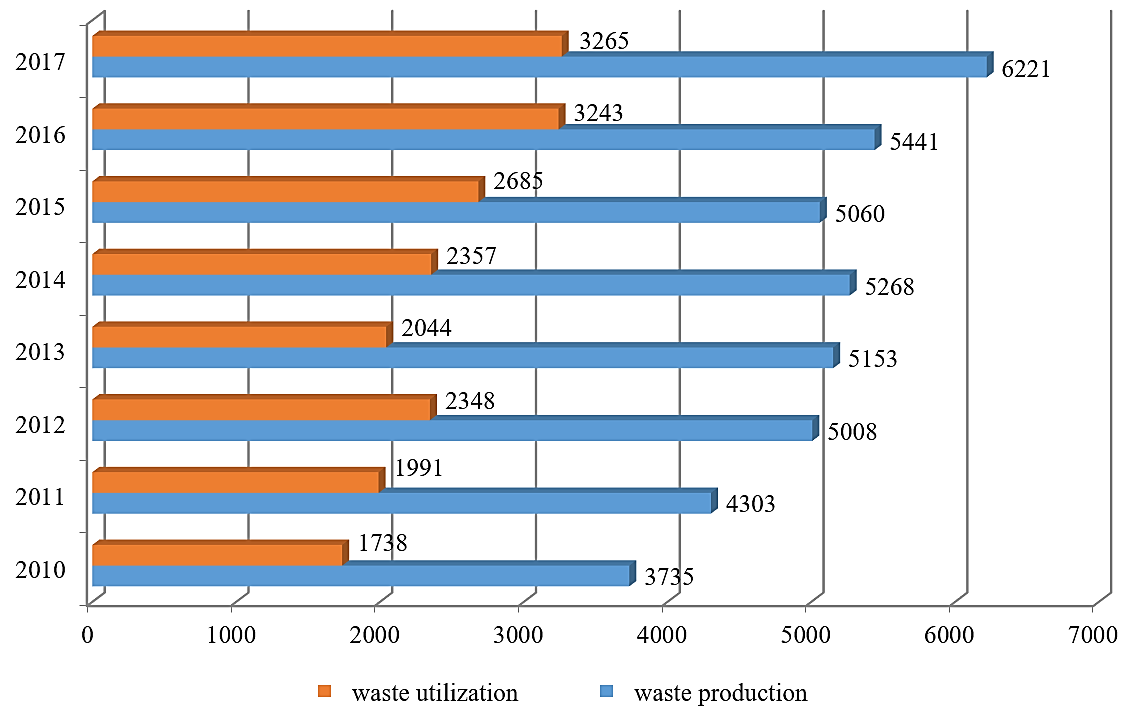Abstract
The article presents the basis accompanying the transition of socio-economic systems from the "brown" model to the "green" one in an analytical way. The authors analyze the theoretical foundation, methodological framework and practical value for the society in the continuation of the conception of the sustainable development on the basis of the "green" economy model. There were demonstrated initiatives and the experience of a number of countries and inter-country associations actively involved into the implementation of "green" innovations. There are presented the data on the existing objective difficulties in the development of the Russian economy in the current period according to the "green" scenario. There were positively assessed the prospects for the application of these efforts for a prolonged perspective. At this moment the Russian economy takes new development directions and focuses on the innovation. Modern development vector of the national economic system is characterized by transformation from a "brown" to a "green" economy, realising all future risks and opportunities. During several last years implementation of "green" initiatives becomes reasonable to take into account the experience of other countries and their associations. There are many problems associated in Russia caused from the one hand with the heritage of the active development of industrial production in the traditional scenario, from the other, the lack of full access to "green" innovations from foreign countries due to the relatively closed new technology markets.
Keywords: "Green" and "brown" model of economyconception of the sustainable development"green" innovations
Introduction
In the current conditions of life of the modern society, it becomes obvious that in the recent past, actively implemented option of social development, aimed at continuous improvement of labor efficiency, intensification of production, the growing "conquest of nature" and the welfare of the majority of the population now has an alternative and cannot be carried out in a prolonged perspective. Such a scenario of the social development has already led and, in future, in the case of continuation of such practices in some regions of the world, will inevitably lead to aggravation of global problems associated, first of all, with the exhaustion of resources, environmental consequences, including climate change, and, accordingly, the depletion of flora and fauna, the anthropogenic landscape change, which cannot be corrected, and, in future, possibly, will not be suitable for a full human life.
Understanding these problems by ruling elites, the scientific community and representatives of big business, focus on the search for options and ways of the sustainable development of society because of discovering global problems, determined both various theoretical substantiation for the introduction of the platform of the "green economy", opposed to the model of the "brown economy", and practical measures for enrooting the environmental standards fixed in the relevant legal documents.
Problem Statement
Describing the "green economy", it is necessary to define the terminology and note that the conception of the "green economy" can and should be interpreted as the continuation or a part of the conception of the sustainable development, which in turn is based on a triad of interrelated social, economic and environmental components. Focus on the preservation of comfortable living conditions for future generations is expressed in this approach.
The researchers note that the priority is to determine the goal of the society development and to find conditions contributing to its achievement. As a rule, social and environmental components play a leading role in this approach, and the economic one is in a subordinate position (Lyaskovskaya, 2018).
On the contrary, there may prevail the approach according to which the sustainability of the economy, which is correlated with other parameters to minimize possible negative consequences is dominating. This is an option, in fact, of the stable and non-conflict development of the society, prolonged for the long term (Lyaskovskaya, 2017).
The conception of the inclusive sustainable growth, substantiating the connection of the economic growth with the solution of various social problems and modern challenges, is widespread, too. In particular, in this conception, there is a task to equalize the opportunities of members of society. This task takes into account the interests of socially unprotected or poorly protected segments of the population, involve them into obtaining a "chance" for proper life and prospects for personal growth (Fuks, 2016; Inclusive Green Growth: The Pathway to Sustainable Development, The World Bank Washington, 2012; Pakhomova et al., 2014).
According to Pakhomova et al. (2014) the problem of finding a platform for the further balanced development and, accordingly, the choice of a model that allows to combine a triad of economic, social and environmental goals of society is important in this context.
The scientific, business and expert community realize the problems of finding an effective model for the further development of society. In particular, in terms of the search for this model, the assessment of the risks of the society development is a necessary component. Experts of the world economic forum include into these risks climate change, and the unequal distribution of resources, which naturally hinders the balanced development of the society as a whole (The Global Risks Report, 2017).
Research Questions
There are many points of view on the establishment of the sustainable development directions, practical opportunities of such solutions for the whole society; the content of the model of "green economy" and the limitations that can prevail in the case of such a transition. All this actualizes the issues of the study of the essential content of the model of "green economy", the prospects of its widespread formation and the possibilities of the social development on this ideological basis.
Purpose of the Study
The purpose of this research is the study of the essential content of the model of "green economy", the prospects of its widespread formation and the possibilities of the social development on this ideological basis.
Research Methods
In order to find a balanced development path, the scientific community carefully analyses the current economic model (traditionally called by researchers as the "brown economy") and the existing promising changes proposed in the "green economy" (Table
A kind of "label" of the maturity of the implementation of "green" initiatives is the attitude of public administration to the problems of energy efficiency. Thus, a credible approach to this issue from the state can be considered such an approach when it creates conditions for business, allowing it to implement "green" innovations. That is, we are not talking about a system of penalties and prohibitions, but about the introduction of incentive measures for those who do not only comply with the standards, but exceed them, introduce additional own rules and internal standards that are ahead of the official requirements fixed in the relevant documents. In this context, agreeing with other researchers, it can be noted that the energy intensity of Russia's GDP is 2.5, that is 3.5 times higher than the world average (especially in developed countries) (Rudneva, 2014). This involves revising existing approaches, including by the state in terms for the general management of the "green" economy effective "launch".
Figure

It is noted in a number of investigations that there has already been a doubling of funds allocated to the development of renewable energy sources. Further, there was also marked the growth "in developed countries is 3 %, in developing countries is 36 %, and 63% of investments by developing countries are in China" (Sedash, 2016, p. 52).
In this context, the existing "green" initiatives already actively undertaken in a number of states, contributing to the development of the economies of countries and their associations on the basis of the "green" model, are considered to be interesting (Figure

According to the European renewable energy Directive of 2008, the share of renewable energy sources should reach 20% by 2020. In the USA, it is planned to increase the share of these sources in the total consumption up to 25% by the specified time limit, while in China the share limit is set up to 15% (Porfiriyev, 2012). With regard to the conditions for the development of "green initiatives" in the Russian Federation, the share value of this indicator by 2020 is planned to be 3.5 - 4.0% (Kostoglodov et al., 2014).
Findings
Anticipating the situation that characterizes the development of the "green" economy in Russia, it is necessary to describe the existing methodological approaches which makes it possible to determine the conceptual basis for its consolidation.
For example, for the prolongation of sustainable development initiatives, it is customary to highlight a technological approach to the formation of a "green economy". In the legal field, such initiatives are manifested in a set of documents on the creation of a safe ecosystem. The ideal is the transition of all production processes to "green" innovation. It can be noted that the presented approach, undoubtedly, seems attractive, but currently cannot be implemented in full or significant scale in Russia.
Bochko (as cited in Porfiriyev, 2012) analyzes in detail the sectoral approach implying the "green" development of some branches of the national economy and the offer to the society of organic (environmentally friendly) food in the volumes enough for satisfaction of needs of the most part of the population.
A number of other authors in this aspect investigate the development of markets for organic food (Anisimov & Huziev,2013). As for the resources that ensure the development of society in this scenario, researches note the increase in the share of alternative, renewable energy sources and set goals to reduce the energy intensity of GDP (UNEP, 2011).
Along with the above-mentioned approach, the moral and environmental approach is in great demand, especially in the cultural concept of European civilization. It draws a parallel between the desire to solve the problem of social stratification and overcoming poverty with the elimination of environmental problems. An example in this case is the "Report of the UN environment Programme (UNEP) "Towards a "green" economy: ways to the sustainable development and poverty eradication" (2011)" (Porfiriyev, 2012). This document defines the target task of the "green" economy as "improving the welfare of people and ensuring social justice .... reducing risks to the environment and impoverishment of nature" (The Environmental Rating of Subjects of the Russian Federation in autumn of 2018, 2018). Speaking about the initiatives to establish a "green" model of the economy in Russia, it should be noted that in this process all three presented methodological foundations are manifested.
Also, it is important in this matter to characterize the representation of regions in the Ecological rating of subjects of the Russian Federation in autumn of 2018 (Table
As we can see, according to above information, the areas with developed industry automatically have low indicators in the environmental rating. Large megacities such as Moscow and Saint-Petersburg have significantly improved their positions thanks to financing and introduction of balanced perspective programs of their own development. As we can see, Southern regions, famous for agriculture and recreational services are inferior to them.
The question of the environmental burden in the Russian Federation, which, for example, can be illustrated in the form of the dynamics of waste generation and the volume of their utilization and disposal (Figure

As we can see, the tasks of the organization of full utilization and disposal of waste, in general, in Russia remain more than relevant. The current situation has a restraining effect on the development of the "green" model of the economy in the country.
Conclusion
Assessing the existing theoretical approaches to the content of the "green" economy and its role in the development of the society, it can be noted that all of them can be considered as fair, they completely describe changes. The Russian economy, as well as other countries, focused especially on the innovative development of the national economic system, is characterized by initiatives to move from a "brown" to a "green" economy.
In this regard, it is reasonable to take into account the experience of other countries and their associations in the implementation of "green" initiatives. At the same time, in Russia there are many problems associated with the heritage of the active development of industrial production in the traditional scenario and the lack of full access to "green" innovations from foreign countries due to the relatively closed new technology markets.
We believe that it is necessary to implement comprehensive efforts in this direction, related to the state program aimed at the stimulation of "green" innovations, the involvement of large, medium and small businesses into the creation of "green" innovation and mandatory and voluntary adherence to "green" standards.
Also, it is necessary to involve society into the process of transition to existence in the conditions of the "green" economy model. This involves educational and training activities, encouragement of such efforts in practice, not in words. In our view following these guidelines makes it possible to accelerate the transition of the national economy to "green rails" and will contribute to the sustainable development of the Russian society, taking into account the interests of the modern and future generations of Russians.
References
- Anisimov, S. P., & Huziev, I. K. (2013). "Green" Economy and the Power Industry. National Projects, 6, 4-13.
- Fuks, R. (2016). The Green Revolution. The Economic Growth without Harm to the Environment. Alpina non-fiction.
- Inclusive Green Growth: The Pathway to Sustainable Development, The World Bank Washington (2012). http://siteresources.worldbank.org/EXTSDNET/Resources/Inclusive_Green_Growth_May _2012.pdf
- Kostoglodov, D. D., Bondarenko, V. A., & Guskov, A. I. (2014). Environmental Marketing in the Development of the Organic Food Market in Russia: Evolution, Current State, Promising Trends (Regional aspect). RSUE.
- Lyaskovskaya, E. A. (2017). Problemy podgotovki kachestvennykh trudovykh resursov v realizatsii kontseptsii ustoychivogo i innovatsionnogo razvitiya [Problems of Preparation of High-quality Labour Resources in the Implementation of the Conception of the Sustainable and Innovative Development.]. Bulletin of the Bashkir State Agrarian University, 4(44), 137-145.[in Rus]
- Lyaskovskaya, E. A. (2018). Formirovaniye «zelenoy» ekonomiki i ustoychivost' razvitiya strany i regionov. [Formation of the "Green" Economy and Stability of the Development of the Country and Regions.]. Bulletin of SUSU Series "Economics and Management", 1(12), 15-22. https://doi.org/10.14529/em180102 [in Rus]
- Pakhomova, N. V., Richter K. K., & Malyshkov G. B. (2014). Inklyuzivnyy ustoychivyy rost: prioritety, pokazateli, mezhdunarodnyy opyt, potentsial koordinatsii s model'yu reindustrializatsii. [Inclusive Sustainable Growth: Priorities, Indicators, International Experience, Potential of Coordination with the Model of Reindustrialization.]. Problems of Modern Economy, 3(51), 15-24. [in Rus]
- Porfiriyev, B. N. (2012). The "Green" Economy: Global Trends and Prospects. Bulletin of the Russian Academy of Science, 4(82), 323-333.
- Rudneva, L. N. (2014). Low-Carbon Economy: Problems and Prospects of the Development. In Problems of Ensuring the Safe Development of Modern Society: Proceedings of the IV International Scientific and Practical Conference: in 2 parts. Publishing house of UMC UPI.
- Sedash, T. N. (2016). Renewable Energy Sources: Investment Promotion in Russia and Abroad. Russian Foreign Economic Bulletin, 5, 50-56.
- State Report On Condition and Protection of the Environment of the Russian Federation in 2017 (2017). https://gosdoklad-ecology.ru/2017/obrashchenie-s-otkhodami-proizvodstva-i-potrebleniya/otkhody-proizvodstva-i-potrebleniya/
- The Assessment of European Environmental Assessments. European Environment Agency (2011). Synthesis report. Copenhagen. http://www.eea.europa.eu
- The Environmental Rating of Subjects of the Russian Federation in autumn of 2018 (2018). http:// www.greenpatrol.ru
- The Global Risks Report (2017). Retrieved from: https://www.weforum.org/reports/the-global-risksreport-2017
- UNEP (2011). http://www.unep.org/greeneconomy
Copyright information

This work is licensed under a Creative Commons Attribution-NonCommercial-NoDerivatives 4.0 International License.
About this article
Publication Date
20 October 2020
Article Doi
eBook ISBN
978-1-80296-089-1
Publisher
European Publisher
Volume
90
Print ISBN (optional)
-
Edition Number
1st Edition
Pages
1-1677
Subjects
Economics, social trends, sustainability, modern society, behavioural sciences, education
Cite this article as:
Bondarenko, V. A., Guzenko, A. V., Guzenko, N. V., & Efremenko, I. N. (2020). “Green” Economy: Theory, Foreign Experience, Modern Problems And Prospects Of Russia. In I. V. Kovalev, A. A. Voroshilova, G. Herwig, U. Umbetov, A. S. Budagov, & Y. Y. Bocharova (Eds.), Economic and Social Trends for Sustainability of Modern Society (ICEST 2020), vol 90. European Proceedings of Social and Behavioural Sciences (pp. 174-182). European Publisher. https://doi.org/10.15405/epsbs.2020.10.03.21

